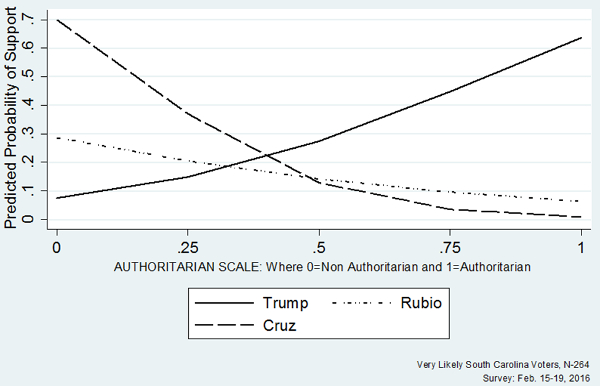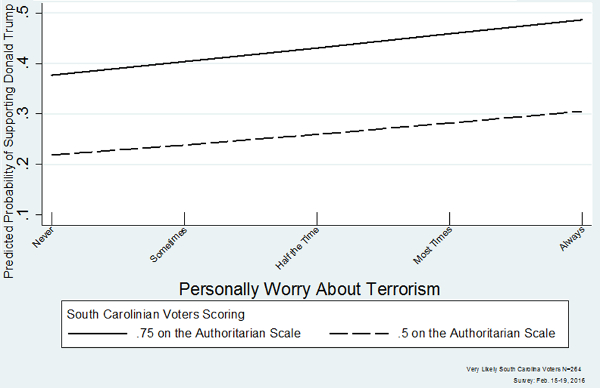 Up to now, many political scientists and commentators have argued that support for Donald Trump is ‘capped’, given that he and Senator Ted Cruz (TX) are competing for the same pool of anti-establishment voters. Using new survey data from South Carolina Republican voters, Matthew C. MacWilliams finds that, along with concerns about terrorism, authoritarianism is a major predictor of people’s support for Donald Trump, and not a predictor of support for Ted Cruz. With these findings in mind, he argues that so long as people are concerned about outside threats – concerns which Trump is stoking – his support will continue to grow.
Up to now, many political scientists and commentators have argued that support for Donald Trump is ‘capped’, given that he and Senator Ted Cruz (TX) are competing for the same pool of anti-establishment voters. Using new survey data from South Carolina Republican voters, Matthew C. MacWilliams finds that, along with concerns about terrorism, authoritarianism is a major predictor of people’s support for Donald Trump, and not a predictor of support for Ted Cruz. With these findings in mind, he argues that so long as people are concerned about outside threats – concerns which Trump is stoking – his support will continue to grow.
With Donald Trump’s victories in South Carolina and Nevada, America’s Authoritarian Spring is now in full bloom. Trump’s rise has raised questions about a current political science theory that describes how the presidential nomination process works and continues to bedevil pundits who argue Trump’s vote share is capped and his voters come from the same anti-establishment “lane” as Senator Ted Cruz.
Let’s take a look at all three of these issues.
First, in their book The Party Decides, leading scholars of American politics argue that political party insiders, defined quite broadly, exert considerable influence over the presidential nomination process, starting with “invisible primaries” and continuing to actual primary nominating contests where votes are cast and delegates are selected. In the Republican nominating process this year, at least so far, party insiders are not in control of the process. American authoritarian voters are and their candidate of choice is Donald Trump.
Take South Carolina. My survey of South Carolinian Republican voters found that authoritarianism was one of only two variables that was a statistically significant and substantive predictor of support for Trump. A voter’s gender, education, age, evangelicalism, ideology, party identification, income, and race simply had no statistical bearing on support for Trump.
The survey was conducted over the last five days leading up to the GOP primary. It predicted Trump would win 33.3 percent of the vote in South Carolina and forecast a second place showing by Rubio. Its findings mirror the results of the national survey conducted under the auspices of the University of Massachusetts Amherst reported here last month.
The importance of authoritarians to Trump’s success is readily apparent in the chart below which arrays predicted probabilities of supporting him, Senator Ted Cruz, and Senator Rubio across the authoritarian scale.
Figure 1 – Support for Trump, Cruz, and Rubio by Authoritarianism, among likely Republican Primary voters

This chart also captures a fallacy at the core of the pundits’ contention that Trump and Cruz are running in the same anti-establishment “lane” and, as such, competing for the same voters. Trump and Cruz may be in the same lane, but there is a big yellow line that divides it right down the middle.
Like Trump, authoritarianism was a statistically and substantively significant predictor of Cruz’s support in South Carolina. Unlike Trump, the sign of the authoritarian coefficient was negative, meaning it is non authoritarians who were much more likely to support Cruz. In South Carolina, the so-called anti-establishment Republican vote was divided into two parts, and the authoritarian part of the vote was larger.
Finally, the second statistically important predictor of Trump’s support in South Carolina was a variable that links authoritarianism and those who are more likely to worry that they or someone in their family will be a victim of terrorism. This connection, or negative interaction, between perceived threat and authoritarian behavior was first identified by Hetherington and Weiler. Its influence on political behavior, when threat is defined as personal fear of terrorism, was demonstrated by Hetherington and Suhay in 2011 in their article in the American Journal of Political Science.
The practical implication of a negative interaction between increasing perceptions of threat and authoritarianism is that those who are not strong authoritarians behave in a more authoritarian manner when confronted by threat. This is exactly the behavior found among South Carolinian supporters of Trump. Voters who were more likely to fear terrorism were also more likely to vote for Trump even though they were not predisposed to be the strongest authoritarians.
Figure 2 – Support for Donald Trump among different levels of authoritarianism arrayed across personal fear of terrorism

These results should be a big red flag to those who argue Trump’s support is capped. It is not. Fear of threats from “the other,” is also a significant driver of Trump’s support. As Trump expands his litany of threats facing America to include economic threats from the Chinese, Vietnamese, Mexicans, and other “others” he “likes,” the appeal of his authoritarian message reaches a broader audience spanning partisan lines. Union voters and other classic Democratic defectors – identified first by Greenberg in the 1980s – become prime targets for Trumpism, as threats from terrorism, immigration, the economy, and to jobs are combined into one systemic threat to America – a threat which, in Trump’s estimation, can only be met by strongman Trump.
The implications of authoritarianism, threat, and the interaction of threat and authoritarianism in the general election, if Trump wins the Republican nomination, should not be underestimated. Those Democrats who think Trump will be an easy opponent to defeat in November may be whistling past the graveyard, resembling the Republican establishment and commentators who dismissed and ignored his candidacy for too long.
Featured image credit: Peter Rukavina (Flickr, CC-BY-NC-SA-2.0)
Please read our comments policy before commenting.
Note: This article gives the views of the author, and not the position of USAPP – American Politics and Policy, nor the London School of Economics.
Shortened URL for this post: http://bit.ly/1RbuZAx
_________________________________
 Matthew C. MacWilliams – University of Massachusetts, Amherst
Matthew C. MacWilliams – University of Massachusetts, Amherst
Matthew C. MacWilliams is a PhD Candidate at the University of Massachusetts Amherst. He is President of MacWilliams Sanders a political communications firm. His research interests including campaign communications, social media, political behavior, authoritarianism in American politics, constitutional law and judicial behavior, the Supreme Court, the political of climate change, interest group lobbying of the judiciary, and election forecasting.







Senator Rubio has taken no action to reduce the rewarding of illegal immigration by giving citizenship to anchor babies. Rubio leans toward higher immigration, population growth, and foreign labor. Voted in favor of granting President Authority to expand immigration levels without Congress’ consent via Trade Promotion Authority in 2015 Sen. Rubio voted in favor of final passage of Trade Promotion Authority bill, H.R. 1314. Senator Rubio on the same wavelength is also patronizing the cheap labor and open border profiteers who are essential stealing our job market.
The Hard core GOP establishment, has dragged Mitt Romney back in the race trying to sell to the American public that Donald Trump has a ‘Bombshell’ in his old tax returns. What’s next that Donald Trump is a North Korean secret agent? It’s very humorous really as the hierarchy at the top of the pecking order is losing–and losing big. I have expletive for this, but I certainly would get suppressed. With Gov Mitt Romney, Hillary Clinton you will live in the same slime of a dying economic uncertainty.
Ford manufacturing and auto parts, Nabisco bakeries have already set their sights on transporting part of their conglomerate to Mexico.
Then, the Indianapolis Business Journal has reported that the manufacturing huge company ‘Carrier’ is motivated, over the next three years in relocating 1,400 jobs to Mexico. Carrier is the foremost air conditioning, heating, and refrigeration systems manufacturer. In another correlated statement, northeast Indiana-based United Technologies Electronic Controls is also to remove jobs to Mexico. By 2018, 700 jobs will materialize in Mexico. No need to speculate that net employment gains is dreary when U.S. manufacturing segment are moving overseas and has been stagnating for months and even years, finding a better opportunity in foreign countries with fewer regulations and cheap labor. Carrier and UTEC are units of the Hartford, Connecticut-based United Technologies Corp., a Fortune 500 company with $65 billion in annual revenue. Watch the heated feedback from stunned Carrier employees at https://www.youtube.com/watch?v=Y3ttxGMQOrY
EVERYBODY GETS A HAND-UP WITH TRUMP, NO MATTER YOUR ORIGIN, CREED, AND SKIN COLOR. THE EXCEPTION IS THE VIOLATORS OF OUR LAWS–ILLEGAL ALIENS. BUT IF YOU LEAVE AND RETURN LEGALLY, YOU WILL BE GIVEN EVERY CHANCE ONCE YOU HAVE ASSIMILATED AS HONEST PERSON. OTHERWISE WITH NEW INNOVATIONS TO E-VERIFY AND A DIGITAL SYSTEM AT ALL PORTS OF ENTRY YOU WILL BE TRACKED DOWN AND EITHER REPATRIATED OR DEPORTED. HEINOUS CRIMINALS WILL NOT BE RELEASED AS THE OBAMA ADMINISTRATION HAS ADMITTED AND WITHOUT TELLING POLICE DEPARTMENTS NATIONWIDE.
A concern with any type of election is electoral fraud, which includes ballot stuffing, bribery, registering false voters, bogus absentee ballots, voter intimidation, and multiple votes by one person, residing in one county and voting in the county or neighboring state; interference with vote counting. Such illegal activity was the eventual investigation of the ‘ACORN’ organization that was registering non-citizens. With the huge influx of illegal aliens this could open doors to voter fraud in electoral precincts by relaxing registration laws, thus making it easier for more people to vote and increasing turnout and if illegal aliens had violated immigration laws once, a second time will be an easy tactic. The Left doesn’t seem to care, and have even urged perplexed illegal people to vote.
This explains this current circus of an election and the racial divide surrounding it. You’ve got one side hypnotized by a master who appeals to their authoritarian inclinations, and the other side trying to make sense of it without understanding the psychological dynamics at play. Not even Trump supporters are privy to exactly why they feel intrinsically connected to him. Throw in the second variable mentioned, fear of terrorism, and this entire scenario becomes more clear, makes perfect sense. It looks a lot less like a circus, and more like the story of a hypnotic overlord wielding a sort of magical power over his supporters. If Trump is aware of this ‘authoritarian link’ amongst his supporters, I believe he will continue to use it to his advantage. I believe we will see him increasingly raise questions about the possibility of opponents and protesters being terrorists, as he did recently, accusing an aggressor at the rally in Kansas City, MO of being a member if ISIS. This fire he’s playing with is surely unpredictable, and it is not good.